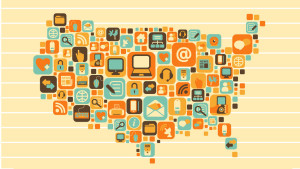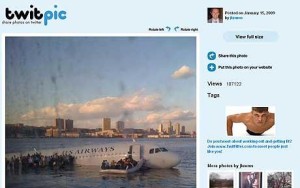Television, radio and print have been the voice of all communication for years, but has social media become the new outlet to obtain information? With approximately 83% of companies obtaining some force of a social media account, it is safe to say that social media is becoming the new dominant. As we all know, once something is posted to the Internet, it is NEVER deleted. With the functionalities of sharing (Facebook) and re-tweeting (Twitter) information, new stories have the power to go viral in a matter of minutes – if not seconds.
Several events have occurred worldwide that were initiated through a social media platform. In 2009, the power of social media through technology was introduced as a New York citizen, Janis Krums, visually witnessed the crashing of United Airways Flight 1549 in the Hudson River by uploading pictures on via Twitpic – a third party photography application allowing users to posts pictures on Twitter. Twitter users documented the incident approximately 15 minutes before mass media nationally reported it.
Later that year, TMZ utilized this pedestal by informing the public via Twitter of the tragic death of Michael Jackson, also attaching a link to their website to elaborate on further details. Other events have emerged via social media before mass media, such as the death of the Osama Bin Laden and the engagement of Prince William and Kate Middleton.
Essentially, I believe mass media and social media works hand in hand. With social media being such a huge channel for the younger generations, this is bound to be a common practice of exposing news events. Social media also allows users to stay connected as they can exchange and research information via hashtags associated with current events to stay updated.
Through the incredible evolution of obtaining information faster, it is also important that we are inspecting the validity in the information received. For example, I view news stories on that appear on my Facebook feed quite often; however, I explore creditable newscast websites to ensure legitimacy. Although I am able to access Facebook and Twitter faster because I incorporate them in my daily schedule, I am still skeptical on certain material that I read. Once it is confirmed from mass media, then I consider it valuable.
References:
Beaumont, C. (2009, January 16). New York plane crash: Twitter breaks the news, again. The Telegraph. Retrieved from http://www.telegraph.co.uk/technology/twitter/4269765/New-York-plane-crash-Twitter-breaks-the-news-again.html
Macnamara, J. (2014). Which media set the news agenda: Mass media or/and social media?: Executuve Summary. Retrieved from Isentia: http://www.isentia.com/assets/blog/special/isentia_whitepaper_layout_international_d1.pdf
Osorio, B. R. (2015). Who’s winning in the mass media vs. social media war? [Blog]. Retrieved from http://www.philstar.com/business-life/2015/06/01/1460257/whos-winning-mass-media-vs.-social-media-war
Wood, M. (2013, April 19). Social media as breaking-news feed: Worse information, faster. CNET. Retrieved from http://www.cnet.com/news/social-media-as-breaking-news-feed-worse-information-faster/



One Response to This means WAR! Mass Media vs. Social Media